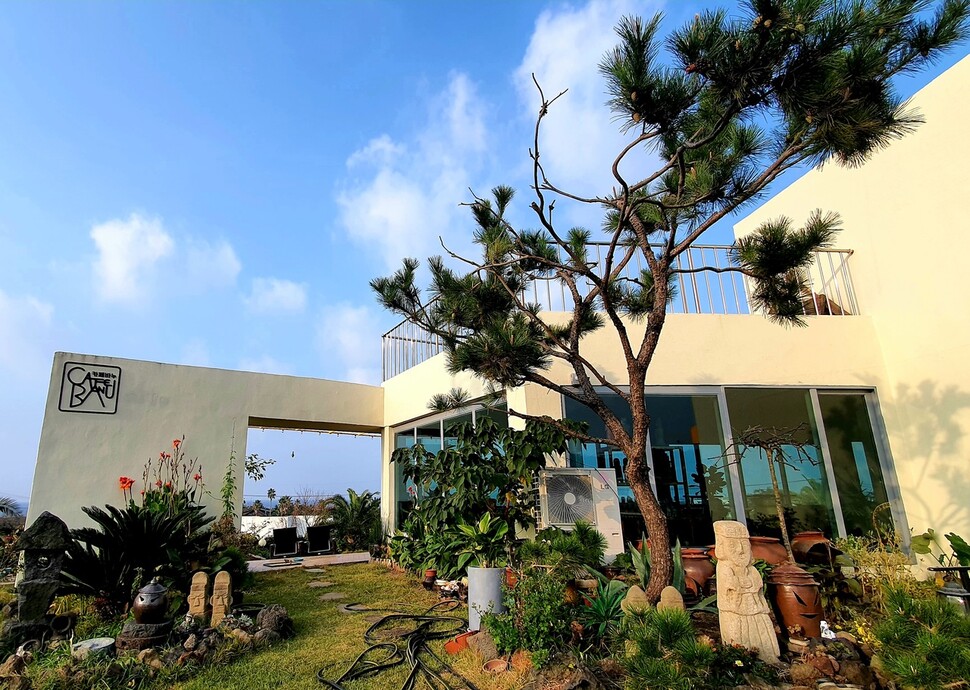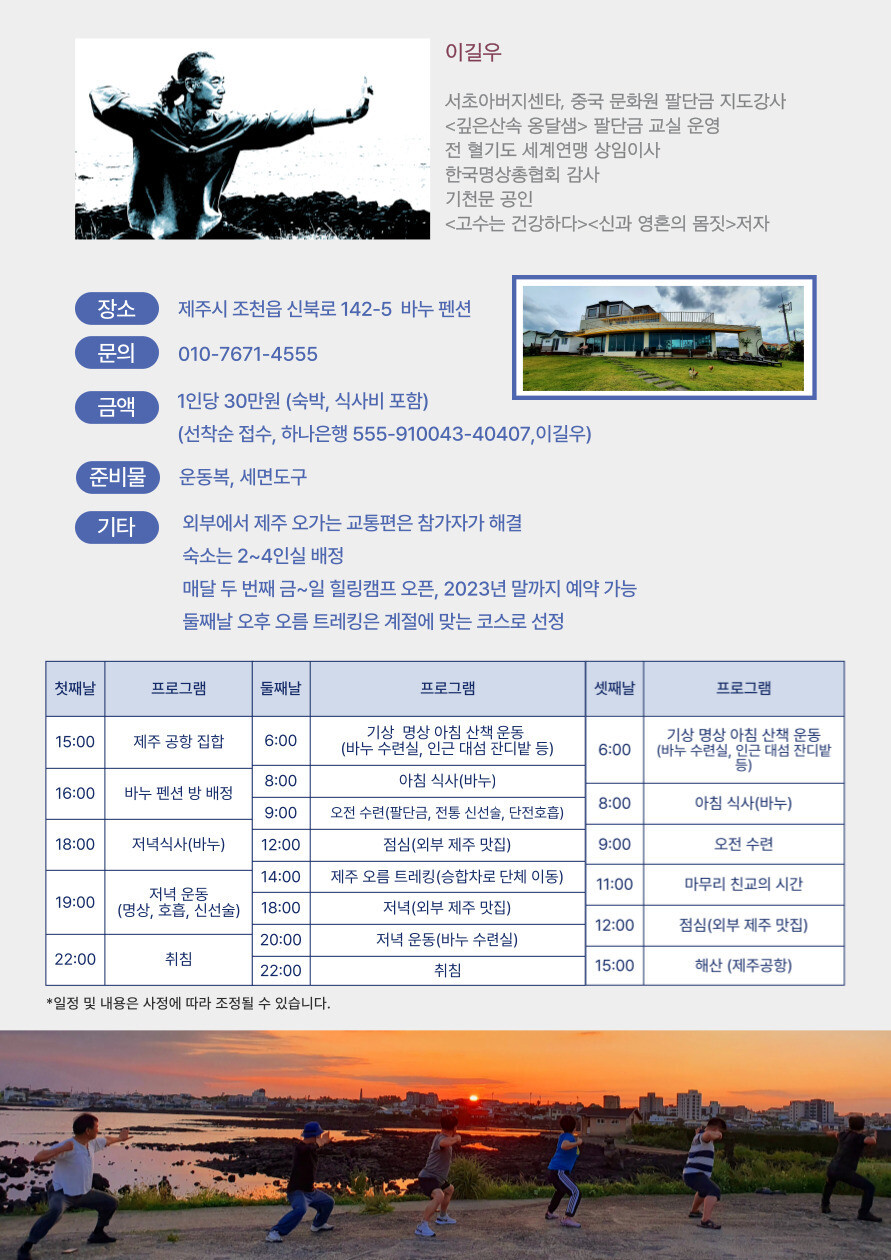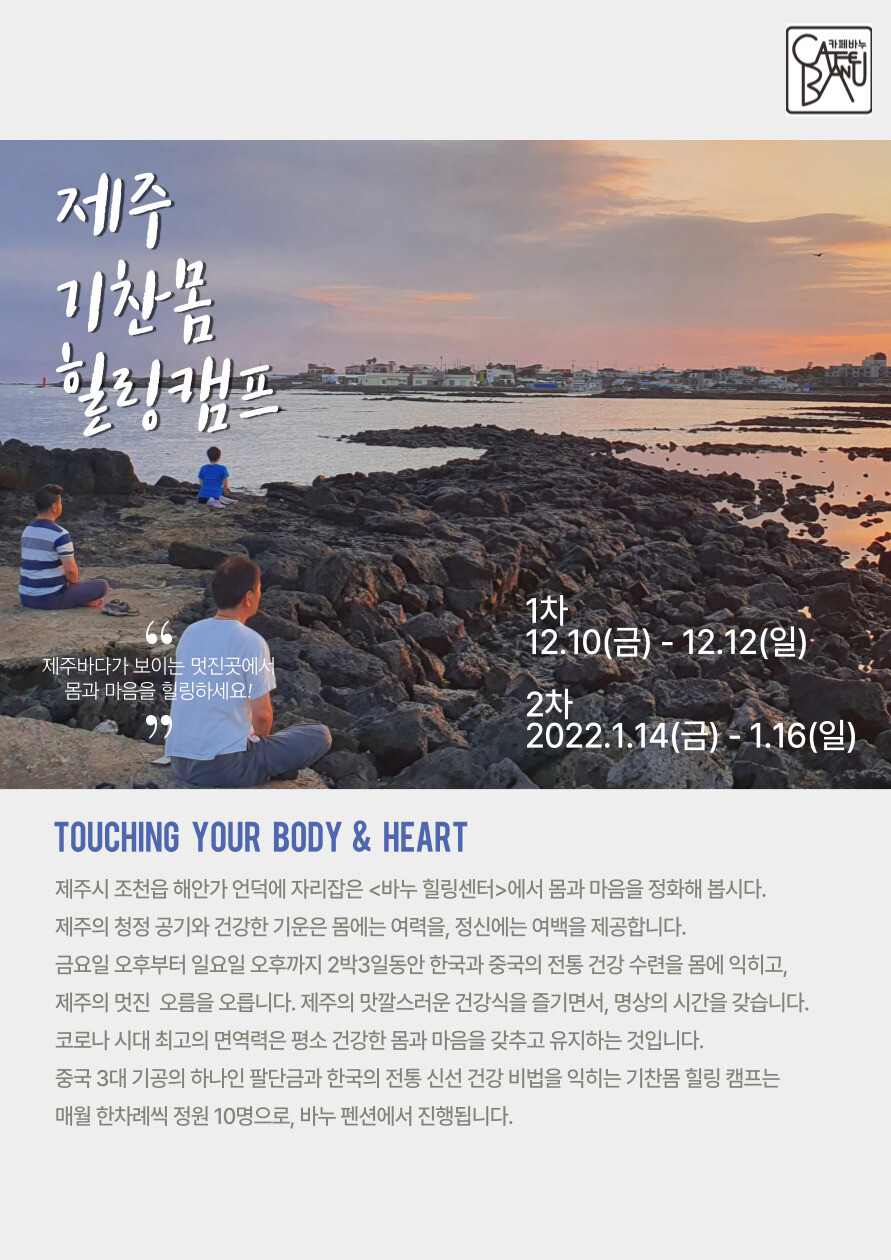2021/11/16
Adrian Glamorgan stupidity is not a deficiency of intellect, but of morality.
몸과 마음 쉬고 재충전하는 ‘제주기찬몸 힐링캠프’ : 뉴스 : 휴심정 : 뉴스 : 한겨레
몸과 마음 쉬고 재충전하는 ‘제주기찬몸 힐링캠프’
등록 :2021-11-16
조현 기자 사진

제주시 조천읍 바누힐링센터. 사진 바누힐링센터 제공
제주도에서도 가장 아름다운 곳 중 하나로 알려진 제주시 조천읍 바다가 한눈에 보이는 바누힐링센터에서 몸과 마음을 쉬면서 재충전하는 힐링캠프가 12월과 내년 1월 2박3일씩 열린다.
제주기찬몸힐링캠프 원장은 평소 동양 전통 무예를 수십년간 수련하며, <한겨레>의 ‘기찬몸’누리집 운영자였던 이길우 전 <한겨레> 기자다. 이 원장은 전통무예인 기천문과 혈기도, 팔단금 등을 수십년간 수련해온 무도인으로, 혈기도 세계연맹 상임이사와 한국명창총협회 감사를 지냈으며, 서울 서초아버지센터 강사, 중국문화원 팔담금 지도강사, ‘깊은산속 옹달샘’팔단금 교실 강사 등으로 활약했다.

기천문과 혈기도는 고강도 수련으로 엄청난 파워를 가지는 전통 무예로 알려져있으며, 팔단금은 아주 간단한 동작만으로도 면역력을 개선시키는 효과를 가져오는 것으로 유명하다.
이원장은 <고수는 건강하다>와 <신과 영혼의 몸짓>의 저자이기도하다.
힐링캠프는 제주시 조천읍 신북로 142-5 바누펜션에서 1차 12월 10~12일, 2차 내년 1월 14~16일 각각 펼쳐진다.

힐링캠프는 캠프가 끝난 뒤 집에서도 평상시 해볼 수 있는 명상과 호흡, 신선술을 배운다. 또 경치 좋은 오름을 함께 오르고, 건강식을 먹으며 지친 몸을 쉴 수 있도록 했다.
힐링캠프는 2차가 끝난 뒤에도 매달 두번째 금~일요일 진행된다. 정원은 10명이다.

바누힐링센터 내부. 사진 바누힐링센터 제공

바누힐링센터 숙소. 사진 바누힐링센터 제공
캠프를 총괄하는 이 원장은 “한번 배우면 좁은 공간에서도 죽는 날까지 지속적으로 할 수 있는 운동이 가장 운동이며, 면역력과 건강을 위해 최선이다”면서 “2박3일 동안 단순한 동작을 반복해 지속할 수 있다는 ‘단반지’(단순·반복·지속)로 평생 건강을 가꾸는 계기가 되는 캠프가 될 것”이라고 말했다. 문의는 010-7671-4555.
조현 종교전문기자 cho@hani.co.kr
원문보기:
https://www.hani.co.kr/arti/well/news/1019518.html?fbclid=IwAR2tF3CSRpnp2WpbQJ40EzqCZPlI-qB_WNhXFyJslg-Sx08hyizt8rcNR5Q#csidx3532b1755e9f6628f13a34ddace11c5
The Pre-Christian Paul Martin Hengel
Martin Hengel - Wikipedia
Martin Hengel
Martin Hengel (14 December 1926[1] – 2 July 2009[2]) was a German historian of religion, focusing on the "Second Temple Period" or "Hellenistic Period" of early Judaism and Christianity.
Biography[edit]
Hengel was born in Reutlingen, south of Stuttgart, in 1926 and grew up in nearby Aalen. In 1943 he was conscripted as a 17-year-old schoolboy into the Wehrmacht and served in an anti-aircraft battery on the Western Front. In 1945, after one of the final battles of World War II, he threw away his weapons and uniform and walked home from France, completing his schooling in 1946.[1] In late 1947 Hengel began his theological studies in Tübingen, moving to the University of Heidelberg in 1949. In 1951 he qualified as a Lutheran parish minister, but in 1954 his father voiced his opposition to this and insisted that he join 'Hengella', the family textile business in Aalen, which makes women's underwear and lingerie.[3]
This caused a ten-year struggle for Hengel, who had to study when he could based around his working hours. The strain on his health led to a serious breakdown. He later referred to these ten years as "wasted years" and gave the impression of almost having an inferiority complex about the amount of study he had been forced to miss. However, he remained a director of the company until his death. In August 1957 he married Marianne Kistler.[1]
For a short period he was also able to lecture at a theological college, and served as an assistant to Professor Otto Michel in Tübingen, but this ended in 1957 when he was sent to manage a factory in Leicester for several years. He continued to work on his doctoral thesis in his spare time.[3] Hengel graduated in 1959 with a PhD. He completed his postgraduate work on his Habilitation thesis, a requirement for academic teaching, at the University of Tübingen in 1967. His thesis was concerned with Judaism and Hellenism. He was a professor at the University of Erlangen starting in 1968.[1] In 1972 Hengel returned to Tübingen to succeed Professor Michel.
Recognized as one of the greatest theological scholars of his time, Martin Hengel focused a great amount of his studies upon the New Testament as well as other theological writings of early Christianity.[4] Hengel specialized in the early period of Rabbinic Judaism including early Christianity and the origins of Christianity.[5] Throughout his writings, Hengel openly recognizes the challenges involved in developing a thorough history of early Christianity. Due to the fact that the sources available to scholars are often found surviving in fragments, as a result, "the sparseness of the sources vitiates our knowledge of large areas of the ancient world".[6] In his article "Raising the Bar: A daring proposal for the future of evangelical New Testament scholarship",[7] Hengel therefore challenges scholars to delve into more extensive biblical research to ensure proper understandings of the texts being established. Hengel's Christology strove to share an accurate illumination of who Jesus was and what he did and sought after as well as the notion that ‘Christianity emerged completely from within Judaism’.[4] After his experience as a soldier in the Second World War, Hengel said:
- "As for these specific errors that have affected my own country, today one may say that among the most important insights of our field of study since the Second World War belongs the recognition of how deeply rooted earliest Christianity is in Judaism as its native soil. This implies that the study of the pre-Christian Judaism of the Hellenistic period as a whole, that is, from the fourth century BCE on, is to be included in our field of study. Here Old and New Testament scholars must work hand in hand".[8]
Not only did Hengel desire that scholars "work hand in hand" but also was known for supporting scholars of all backgrounds.[4] In 1992 he was Emeritus Professor of New Testament and Early Judaism at the University of Tübingen. This period of Judaism includes early Christianity and the field known as Christian Origins. Much scholarly work is currently being done around the intersection of Hellenism, Judaism, Paganism, and Christianity and the ways in which these terms are potentially problematic for the Second-Temple era. Such work of the past two or three decades follows 50 years of work by Hengel, who reconceptualized the scholarly approach to the period in such works as Judentum und Hellenismus, and other scholars.
Within his studies of Rabbinic Judaism and the origins of Christianity, Hengel explored the perceived dichotomy between Judaism and Hellenism. In his study, Judentum und Hellenismus, he documented that the designation of the apostle Paul exclusively as either Jewish or Hellenistic is a misunderstanding.[9] Hengel argues in his writings that despite Paul's controversial rhetoric scholars, along with Jewish and Christian communities, must recognize the historical value of Paul's epistles and Luke's account of Paul's life within the Acts of the Apostles. Hengel recognizes the importance of this awareness because of the multifaceted insight provided about the Second Temple Era and Hellenistic Judaism of the first century within these texts.
A large portion of Martin Hengel's research on the canonical book, the Acts of the Apostles, focuses on the time in which Paul spends between his time in Damascus and Antioch coining these years as "the unknown years".[10] Between Acts and the letters of Paul, Hengel, among other scholars, attempts to piece together the extent of the missionary work of Paul the apostle. Hengel highlights Paul as an "apostle to all nations" (Rom 11:13) throughout his interpretations. He also highlights the miracle of the preservation of the letters of Paul and acknowledges, in correlation with the book of Acts (which set the letters within a historical context), we receive the "nucleus of quite a new form of theological writing in earliest Christianity… and thus also for the New Testament canon".[11]
He considered the traditional account that the Gospel of Mark was written by Peter's interpreter to be essentially credible.[12]
His Institute for Ancient Judaism and Hellenistic Religion attracted scholars from all over the world, including Israel, and the Philip Melanchthon Foundation, which he founded, brought young scholars close to the world of Greek and Roman antiquity.[3]
He received honorary doctorates from the universities of Uppsala,[13] St Andrews, Cambridge, Durham, Strasbourg and Dublin. He was a corresponding member of the British Academy and the Royal Netherlands Academy of Arts and Sciences.[1][14] Hengel died aged 82 in Tübingen, and is survived by his wife, Marianne.
Works[edit]
- Hengel, Martin (1973). Judentum und Hellenismus: Studien zu ihrer Begegnung unter Berücksichtigung Palästinas bis zur Mitte des 2 Jh.s v.Chr. Tubingen: J.C.B. Mohr.
- ——— (1974). Property and Riches in the Early Church (1st English ed.). London: SCM Press (translated by John Bowden).
- ——— (1974). Judaism and Hellenism : Studies in Their Encounter in Palestine During the Early Hellenistic Period (1st English ed.). London: SCM Press.
- ——— (1977). Crucifixion in the Ancient World and the Folly of the Message of the Cross. Philadelphia, PA: Fortress Press.
- ——— (1979). Acts and the History of Earliest Christianity. London: SCM Press.
- ——— (1980). Jews, Greeks, and Barbarians: Aspects of the Hellenization of Judaism in the Pre-Christian Period (1st American ed.). Philadelphia, PA: Fortress Press.
- ——— (1981). The Charismatic Leader and His Followers (1st English ed.). New York, NY: The Crossroad Publishing Company.
- ——— (1981). The Atonement: The Origins of the Doctrine in the New Testament. Philadelphia, PA: Fortress Press.
- ——— (1983). Between Jesus and Paul: Studies in the Earliest History of Christianity. London: SCM Press.
- ——— (1989). The Zealots : Investigations into the Jewish Freedom Movement in the Period from Herod I until 70 A.D. Edinburgh: T. & T. Clark.
- ——— (1989). The 'Hellenization' of Judea in the First Century after Christ. London: SCM Press.
- ——— (1989). The Johannine Question. London: SCM Press.
- ——— (2000). The Four Gospels and the One Gospel of Jesus Christ: An Investigation of the Collection and Origin of the Canonical Gospels (1st North American ed.). Harrisburg, PA: Trinity Press International.
- ———; Schwemer, Anna Maria (2007). Jesus und das Judentum. Geschichte des frühen Christentums. Tübingen: Mohr Siebeck.
References[edit]
- ^ Jump up to:a b c d e Obituary in The Times
- ^ "Theologe Martin Hengel gestorben". Dorstener Zeitung.de. 2009-07-02. Archived from the original on 2009-07-05. Retrieved 2009-07-02.
- ^ Jump up to:a b c Obituary in The Daily Telegraph 13 July 2009
- ^ Jump up to:a b c Society of Biblical Literature. “Martin Hengel 1926-2009.” SBL Forum Archive. Accessed June 10, 2015. http://www.sbl-site.org/publications/article.aspx?articleId=837.
- ^ "Daily Times - Leading News Resource of Pakistan - Ancient Jewish man's remains give clues on crucifixion". www.dailytimes.com.pk. Retrieved 2008-01-23.
- ^ Martin Hengel, Acts and the History of Earliest Christianity (Philadelphia, PA: Fortress Press), pg. 3.
- ^ Hengel, Martin (22 October 2001), "Raising the Bar: A daring proposal for the future of evangelical New Testament scholarship", Christianity Today, 45 (13), pp. 76–79, archived from the original on October 27, 2006, retrieved July 10, 2017
- ^ Hengel, Martin (1996), "Tasks of New Testament Scholarship", Bulletin for Biblical Research, 6: 70
- ^ Roetzel, Calvin J. The Letters of Paul: Conversations in Context. Louisville, KY: Westminster John Knox Press, 1998. P. 55.
- ^ Martin Hengel and Anna Marie Schwemer, Paul Between Damascus and Antioch: The Unknown Years (Louisville, Ky: Westminster John Knox Press).
- ^ Martin Hengel and Anna Marie Schwemer, Paul Between Damascus and Antioch: The Unknown Years (Louisville, Ky: Westminster John Knox Press), pg. 6.
- ^ Theissen, Gerd and Annette Merz. The historical Jesus: a comprehensive guide. Fortress Press. 1998. translated from German (1996 edition). p. 26.
- ^ "Honorary doctorates - Uppsala University, Sweden".
- ^ "Martin Hengel (1926 - 2009)" (in Dutch). Royal Netherlands Academy of Arts and Sciences. Retrieved 17 July 2015.
External links[edit]
- Works by or about Martin Hengel in libraries (WorldCat catalog)
- Obituary in The Times Retrieved on 21 July 2009
- Obituary in The Daily Telegraph Retrieved on 21 July 2009
- Interview at Centre for Public Christianity


